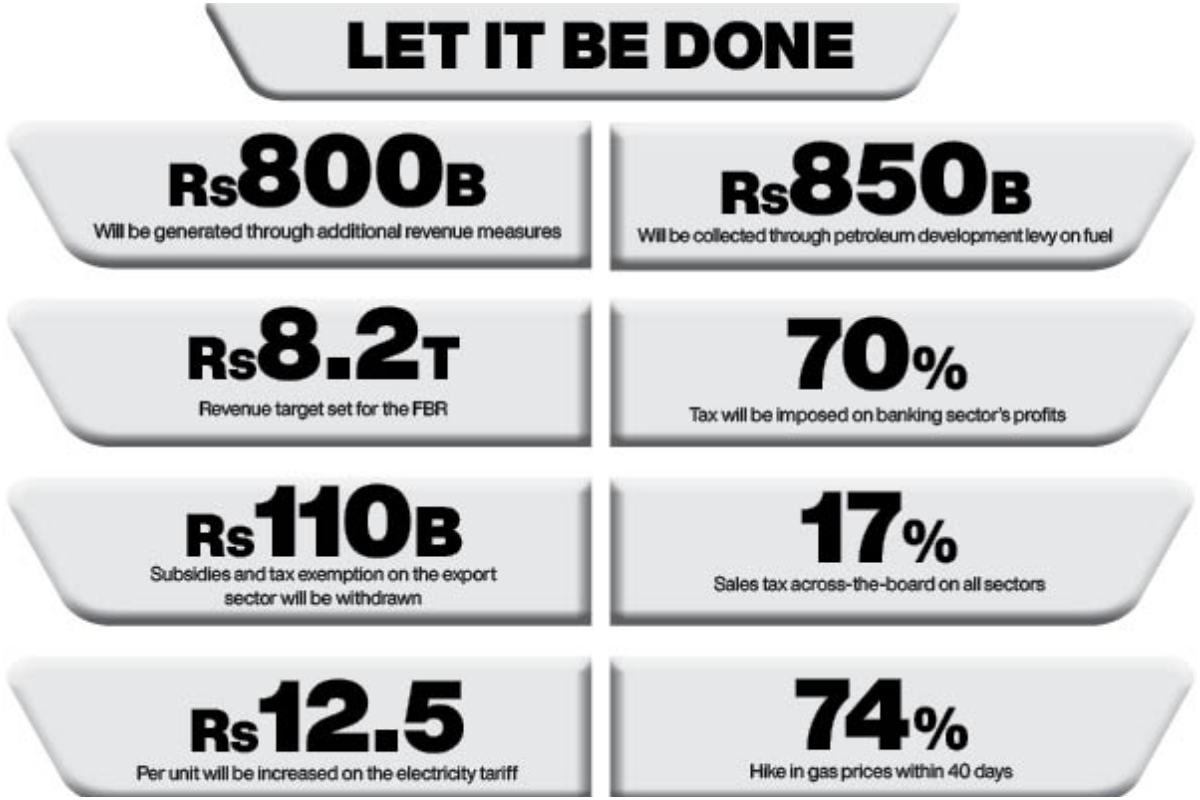
Time to swallow Bitter Pills
The international donor agency unveils set of tough conditions for Pakistan
Islamabad: The International Monetary Fund (IMF) has unveiled a set of tough conditions for Pakistan, including a massive increase in the electricity and petrol prices, withdrawal of all the tax exemptions and imposition of new taxes to meet the financing gap between the revenues and expenditures.
Overall, the international donor agency has sought additional revenue measures in the range of Rs600 to Rs800 billion.
IMF Mission Chief Nathan Porter and his team members started one of the most intense and difficult discussions with the Pakistani authorities to avoid it from default, as the foreign exchange reserves of the central bank have depleted to $3.086 billion, which is only sufficient for three weeks of imports.
The implementation of all the IMF conditions will definitely dent the coalition government’s popularity.
Sources in the Finance Ministry said the IMF has asked the government to not only recover petroleum development levy (PDL) worth Rs850 billion but also impose sales tax on all the petroleum products, besides bringing the tax rate on kerosene and light diesel oil at par with the petrol and HSD prices.
The imposition of sales tax is expected to result in an increase of Rs27/litre in the petroleum prices.
On the revenue side, the IMF wanted withdrawal of subsidies and tax exemptions worth Rs110 billion provided to the export sector. It also wanted to increase the sales tax to 17 per cent across-the-board on all sectors, which stands at 11 per cent on an average.
According to the sources, a flood levy of one to 3 per cent on the import of raw materials and luxury goods is also on the cards. The IMF has also suggested the government to massively increase the withholding tax rate on non-filers.
The IMF mission also expressed dismay over the performance of the Federal Board of Revenue (FBR) and demanded to revise the revenue target from Rs7.47 trillion to Rs8.2 trillion.
A senior official of the Finance Ministry, on the condition of anonymity, said that the IMF believes that with inflation of over 25 per cent, an increase of 21 per cent is not a big deal and it is in no way an achievement.
“It wants the tax-to-GDP ratio to be enhanced from the existing level of 8 per cent to 9 per cent, an increase of one per cent, or Rs800 billion, in terms of value,” the official added.
The mission also suggested the government impose another levy to deduct 65 to 70 per cent tax from lofty profits earned by the banking sector through exchange rate manipulation and increasing the rates of certain withholding taxes.
Meanwhile, the IMF review mission has rejected the revised Circular Debt Management Plan (CDMP) and asked the government to raise the electricity tariff by Rs12.50/unit to restrict the additional subsidy at Rs335 billion for the current fiscal year.
It termed the revised CDMP as ‘unrealistic’ and based on certain wrong assumptions. So, the government will have to bring more changes in its policy prescription to restrict the losses of the cash bleeding power sector.
The IMF and Ministry of Finance will work out a roadmap on the fiscal front under which different additional taxation measures will be finalised and announced in the upcoming mini-budget. The revised CDMP envisages an increase of Rs952 billion in the circular debt for the current fiscal year against an earlier projection of Rs1.526 trillion. The government shared its revised CDMP with the IMF high-ups, which shows the government required an additional subsidy of Rs675 billion, despite raising the power tariff in the range of Rs7/unit through quarterly tariff adjustment in the first two quarters of 2023 and Rs1.64 for the third quarter from June to August.
“The IMF has asked the government to raise the power tariff in the range of Rs11 to Rs12.50/unit so that the requirement of additional subsidy could be reduced to half from its existing levels of Rs675 billion for the current fiscal year,” the official added
The IMF also wanted to slash the subsidy slab for the consumers from the existing 300 units to mere 100 units.
The review mission also raised questions regarding the calculation of additional subsidy of Rs675 billion for the current fiscal year. The government has understated the exchange rate for calculating the revised CDMP, so with the existing rate the plan would be changed.
The revised CDMP seeks to restrict losses of the power distribution companies to 16.27 per cent, on an average, during the current fiscal year.
The government envisaged the target to recover fuel cost adjustment (FCA) charges deferred last summer to fetch Rs20 billion into the kitty against the estimates of Rs65 billion made on the eve of the last summer.
The markup saving due to the independent power producers (IPPs) stock payment will bring Rs11 billion. The general sales tax (GST) and other taxes on a collection basis will help recover Rs18 billion in the current fiscal year, it showed.
The circular debt is estimated to hover around Rs2.113 trillion till the end of FY23, including the amount parked in the Power Holding Limited (PHL), Rs765 billion and Rs1,248 billion payables to the power producers and Rs100 billion to the fuel suppliers.
To overcome the circular debt in the gas sector, the IMF asked the government to increase the prices by fully implementing the raise of 74 per cent proposed by the Oil and Gas Regulatory Authority (Ogra). The hike in the gas prices has to be implemented within 40 days, which will lapse on February 10.
According to sources, the government is considering presenting the amended Finance Bill in both houses for approval by February 8, so that it would not provide any opportunity to the opposition or any other political party for blame game in the future.
“At present, all the coalition parties and even the opposition knows that the IMF is the last hope to save the country from default so developing consensus on this issue would not be a problem,” the official said.
The latest data of the Economic Affairs Division (EAD) shows that the country could fetch loans of $5.59 billion in the first half (July-December) period of the current fiscal year against a total projection of $22.6 billion. Pakistan had received total disbursements of loans and grants worth $9.13 billion in the same period during the last financial year 2021/22.
Minister of State for Finance Aisha Ghaus Pasha, in an interaction with media, said that the cost of power generation was on the higher side, while the recovery was less, meaning the country could not afford subsidy anymore.
The government would not put the burden on the consumers alone and the elite and affluent class would also have to contribute by paying the full cost of electricity generation, she added.
The Power Division has presented its plan to tackle the circular debt issue, she noted.
During the talks, the IMF has also demanded Pakistan to amend laws for assets declaration of public servants, which also included judges and personnel of armed forces.
FBR sources said the IMF wanted public declaration of the government servants’ assets, adding that it has also demanded details of the overseas assets of the bureaucracy, judges and generals.
“The assets of the bureaucrats will be inquired before opening a bank account,” the sources said, adding: “The banks will get such information from the FBR.”
Prime Minister Shehbaz Sharif has publicly acknowledged that the IMF delegation is giving a tough time to Finance Minister Ishaq Dar and his team.
“Our economic challenge at this moment is unimaginable. The conditions we have to fulfil [to complete the IMF review] are beyond imagination,” he said.
However, the country had no other option but to implement the conditions, the premier said while addressing an Apex Committee meeting in Peshawar.
Dr Ikramul Haq, a senior economist said that the IMF conditions are a bit harsh.
“The demands made by the IMF are a bit harsh but because of the criminal negligence of the incumbent and the previous governments the country has reached the verge of default.
Neither the present nor the previous successive governments have ever tried to implement the reforms agenda initiated by the IMF, he said, adding that the IMF demand for declaration assets is justified, as the perks and other facilities our ministers, bureaucrats, judges and generals are enjoying, are enormous.
The successive governments wrong policies have led to an increase in the circular debt of the power and gas sectors, he added.
“The majority of federal and provincial departments owe billions of rupees to the power companies but they receive uninterrupted electricity, whereas the consumers have been forced to pay capacity charges to the IPPs for electricity they have never consumed,” he added.
For Dr Haq, the prime minister with a cabinet size of over 80 members cannot ask the masses to adopt austerity measures.
According to estimates, some of the IT sector companies have kept $5 to $25 billion in foreign countries because of the complicated taxation matters.
According to Dr Haq, the removal of the Pakistan Tehreek-e-Insaf (PTI) government and the removal of Miftah Ismail from the finance minister’s slot were the main reasons behind the worsening conditions of the country.
In the meantime, Pakistan and the IMF will continue technical level talks during the next couple of days; followed by the policy level talks to finalise the Memorandum of Financial and Economic Policies (MEFP) document next week.
Catch all the Economic Pulse News, Breaking News Event and Latest News Updates on The BOL News
Download The BOL News App to get the Daily News Update & Live News.








 Read the complete story text.
Read the complete story text. Listen to audio of the story.
Listen to audio of the story.